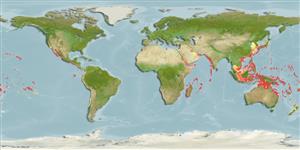Echinoidea |
Diadematoida |
Diadematidae
Environment: milieu / climate zone / djupintervall / distribution range
Ekologi
; djupintervall 0 - 70 m (Ref. 81020). Tropical
Indo-Pacific: East Africa to the South Pacific Islands and Japan.
Length at first maturity / Size / Weight / Age
Könsmognad: Lm ? range ? - ? cm Max length : 25.0 cm WD hane/ej könsbestämd; (Ref. 87866)
Maximum length assumed to refer to total width (spinetip to spinetip) based on Ref. 87866. Occurs in shallow waters, especially in disturbed areas where it occurs in large aggregations. Feeds on algae. Associated with Stegopontonia commensalis (commensal) (Ref. 800).
Life cycle and mating behavior
Könsmognad | Reproduktion | Lek | Eggs | Fecundity | Larvae
Members of the class Echinoidea are gonochoric. Fertilization is external. Brooding is common, eggs are held either on the peristome, around the periproct or deep into the concavities on the petaloids. Life cycle: Embryos develop into planktotrophic larvae (echinoplateus) and live for several months before they sink to the bottom using their tube feet to adhere on the ground where they metamorphose into young urchins.
Schoppe, S. 2000 A guide to common shallow water sea stars, brittle stars, sea urchins, sea cucumbers and feather stars (echinoderms) of the Philippines. Times Media Private Limited, Singapore. 144 p. (Ref. 800)
IUCN Red List Status
(Ref. 130435: Version 2025-1)
CITES status (Ref. 108899)
Not Evaluated
Not Evaluated
Threat to humans
Harmless
Human uses
Fiskeri: kommersiell
| FishSource | Sea Around Us
Verktyg
Ytterligare information
PhysiologySyreförbrukning
Human RelatedStamps, coins, misc.
Internet-källor
Estimates based on models
Preferred temperature
(Ref.
115969): 21.1 - 28.8, mean 27.2 (based on 794 cells).
Fishing Vulnerability
Low vulnerability (19 of 100).
Price category
Unknown.
Nutrients : Calcium = 126 [75, 177] mg/100g; Iron = 5.08 [1.67, 7.92] mg/100g; Protein = 12%; Omega3 = 0.331 [0.263, 0.400] g/100g; Selenium = 0.04 [48.48, 67.17] μg/100g; VitaminA = 0 μg/100g; Zinc = 1.97 [0.92, 3.02] mg/100g (wet weight); based on
nutrient studies.
